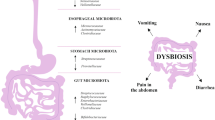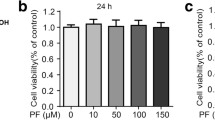Abstract
Background
Dextran Sulfate Sodium (DSS) induces ulcerative colitis (UC), a type of inflammatory bowel disease (IBD) that leads to inflammation, swelling, and ulcers in the large intestine. The aim of this experimental study is to examine how sinomenine, a plant-derived alkaloid, can prevent or reduce the damage caused by DSS in the colon and rectum of rats.
Material and methods
Induction of ulcerative colitis (UC) in rats was achieved by orally administering a 2% Dextran Sulfate Sodium (DSS) solution, while the rats concurrently received oral administrations of sinomenine and sulfasalazine. The food, water intake was estimated. The body weight, disease activity index (DAI), colon length and spleen index estimated. Antioxidant, cytokines, inflammatory parameters and mRNA expression were estimated. The composition of gut microbiota was analyzed at both the phylum and genus levels in the fecal samples obtained from all groups of rats.
Results
Sinomenine treatment enhanced the body weight, colon length and reduced the DAI, spleen index. Sinomenine treatment remarkably suppressed the level of NO, MPO, ICAM-1, and VCAM-1 along with alteration of antioxidant parameters such as SOD, CAT, GPx, GR and MDA. Sinomenine treatment also decreased the cytokines like TNF-α, IL-1, IL-1β, IL-6, IL-10, IL-17, IL-18 in the serum and colon tissue; inflammatory parameters viz., PAF, COX-2, PGE2, iNOS, NF-κB; matrix metalloproteinases level such as MMP-1 and MMP-2. Sinomenine significantly (P < 0.001) enhanced the level of HO-1 and Nrf2. Sinomenine altered the mRNA expression of RIP1, RIP3, DRP3, NLRP3, IL-1β, caspase-1 and IL-18. Sinomenine remarkably altered the relative abundance of gut microbiota like firmicutes, Bacteroidetes, F/B ratio, Verrucomicrobia, and Actinobacteria.
Conclusion
The results clearly indicate that sinomenine demonstrated a protective effect against DSS-induced inflammation, potentially through the modulation of inflammatory pathways and gut microbiota.













Similar content being viewed by others
Data availability
The data of the study are available from the corresponding author upon reasonable request.
References
Ali FEM, Ibrahim IM, Ghogar OM et al (2023) Therapeutic interventions target the NLRP3 inflammasome in ulcerative colitis: comprehensive study. World J Gastroenterol 29:1026–1053
Badr G, Elsawy H, Malki MA et al (2020) Protective effects of myristicin against ulcerative colitis induced by acetic acid in male mice. Food Agric Immunol 31:435–446. https://doi.org/10.1080/09540105.2020.1739626
Bai D, Du J, Bu X et al (2021) ALDOA maintains NLRP3 inflammasome activation by controlling AMPK activation. Autophagy. https://doi.org/10.1080/15548627.2021.1997051
Biasizzo M, Kopitar-Jerala N (2020) Interplay Between NLRP3 Inflammasome and Autophagy. Front Immunol 11:78
Cai B, Pan J, Chen H et al (2021) Oyster polysaccharides ameliorate intestinal mucositis and improve metabolism in 5-fluorouracil-treated S180 tumour-bearing mice. Carbohydr Polym. https://doi.org/10.1016/j.carbpol.2020.117545
Cao H, Liu J, Shen P et al (2018) Protective Effect of Naringin on DSS-Induced Ulcerative Colitis in Mice. J Agric Food Chem 66:13133–13140. https://doi.org/10.1021/acs.jafc.8b03942
Cao R, Ma Y, Li S et al (2020) 1,25(OH)2D3 alleviates DSS-induced ulcerative colitis via inhibiting NLRP3 inflammasome activation. J Leukoc Biol 108:283–295. https://doi.org/10.1002/JLB.3MA0320-406RR
Corthésy B, Gaskins HR, Mercenier A (2007) Cross-talk between probiotic bacteria and the host immune system. J Nutr 137:7815
Da Silva BC, Lyra AC, Rocha R, Santana GO (2014) Epidemiology, demographic characteristics and prognostic predictors of ulcerative colitis. World J Gastroenterol 20:9458–9467
de Nascimento R, P do, Machado AP da F, Galvez J, et al (2020) Ulcerative colitis: Gut microbiota, immunopathogenesis and application of natural products in animal models. Life Sci 258:7345
Dutra RC, Claudino RF, Bento AF et al (2011) Preventive and therapeutic euphol treatment attenuates experimental colitis in mice. PLoS ONE. https://doi.org/10.1371/journal.pone.0027122
Fu R, Wang L, Meng Y et al (2022) Apigenin remodels the gut microbiota to ameliorate ulcerative colitis. Front Nutr. https://doi.org/10.3389/fnut.2022.1062961
Gagnière J, Raisch J, Veziant J et al (2016) Gut microbiota imbalance and colorectal cancer. World J Gastroenterol 22:501–518
Gao W, Wang C, Yu L et al (2019) Chlorogenic acid attenuates dextran sodium sulfate-induced ulcerative colitis in mice through MAPK/ERK/JNK Pathway. Biomed Res Int. https://doi.org/10.1155/2019/6769789
Gao Y, Zhou B, Zhang H et al (2022) L-Ergothioneine exhibits protective effects against dextran sulfate sodium-induced colitis in mice. ACS Omega 7:21554–21565. https://doi.org/10.1021/acsomega.2c01350
He C, Gao M, Zhang X et al (2022) The protective effect of sulforaphane on dextran sulfate sodium-induced colitis depends on gut microbial and Nrf2-Related Mechanism. Front Nutr. https://doi.org/10.3389/fnut.2022.893344
Il KT (2015) The role of barrier dysfunction and change of claudin expression in inflammatory bowel disease. Gut Liver 9:699–700
Itani S, Watanabe T, Nadatani Y et al (2016) NLRP3 inflammasome has a protective effect against oxazolone-induced colitis: A possible role in ulcerative colitis. Sci Rep. https://doi.org/10.1038/srep39075
Kihara N, De La Fuente SG, Fujino K et al (2003) Vanilloid receptor-1 containing primary sensory neurones mediate dextran sulphate sodium induced colitis in rats. Gut 52:713–719. https://doi.org/10.1136/gut.52.5.713
Kim MJ, Yoon JH, Ryu JH (2016) Mitophagy: A balance regulator of NLRP3 inflammasome activation. BMB Rep 49:529–535. https://doi.org/10.5483/BMBRep.2016.49.10.115
Li L, Fang P, Chen J et al (2021) Protective effect of sinomenine on isoproterenol-induced cardiac hypertrophy in mice. J Appl Biomed 19:142–148. https://doi.org/10.32725/jab.2021.014
Li Y, Cai W, Ai Z et al (2023) Protective effects of sinomenine hydrochloride on lead-induced oxidative stress, inflammation, and apoptosis in mouse liver. Environ Sci Pollut Res 30:7510–7521. https://doi.org/10.1007/s11356-022-22386-1
Liu D, Huo X, Gao L et al (2018) NF-κB and Nrf2 pathways contribute to the protective effect of Licochalcone A on dextran sulphate sodium-induced ulcerative colitis in mice. Biomed Pharmacother 102:922–929. https://doi.org/10.1016/j.biopha.2018.03.130
Liu Y, Fang H, Liu H et al (2021) Goji berry juice fermented by probiotics attenuates dextran sodium sulfate-induced ulcerative colitis in mice. J Funct Foods. https://doi.org/10.1016/j.jff.2021.104491
Low D, Nguyen DD, Mizoguchi E (2013) Animal models of ulcerative colitis and their application in drug research. Drug Des Devel Ther 7:1341–1356
Lu C, Guo X, He X et al (2022) Cardioprotective effects of sinomenine in myocardial ischemia/reperfusion injury in a rat model. Saudi Pharm J 30:669–678. https://doi.org/10.1016/j.jsps.2022.04.005
Mahmoud TN, El-Maadawy WH, Kandil ZA et al (2021) Canna x generalis L.H. Bailey rhizome extract ameliorates dextran sulfate sodium-induced colitis via modulating intestinal mucosal dysfunction, oxidative stress, inflammation, and TLR4/ NF-ҡB and NLRP3 inflammasome pathways. J Ethnopharmacol. https://doi.org/10.1016/j.jep.2020.113670
Mazziotta C, Tognon M, Martini F et al (2023) Probiotics Mechanism of Action on Immune Cells and Beneficial Effects on Human Health. Cells 12:8
Min X, Guo Y, Zhou Y (2021) Protection against dextran sulfate sodium-induced ulcerative colitis in mice by neferine, a natural product from nelumbo nucifera gaertn. Cell J 22:523–531. https://doi.org/10.22074/cellj.2021.6918
Miranda KM, Espey MG, Wink DA (2001) A rapid, simple spectrophotometric method for simultaneous detection of nitrate and nitrite. Nitric Oxide - Biol Chem 5:62–71. https://doi.org/10.1006/niox.2000.0319
Morsy MA, Gupta S, Nair AB et al (2019) Protective effect of spirulina platensis extract against dextran-sulfate-sodium-induced ulcerative colitis in rats. Nutrients. https://doi.org/10.3390/nu11102309
Okayasu I, Hatakeyama S, Yamada M et al (1990) A novel method in the induction of reliable experimental acute and chronic ulcerative colitis in mice. Gastroenterology 98:694–702. https://doi.org/10.1016/0016-5085(90)90290-H
Patel JI, Kumbhani M, Raval MM (2022) Protective effect of nelumbo nucifera plant on dextran sodium sulfate-induced ulcerative colitis in rats. Ann Natl Acad Med Sci 58:078–086. https://doi.org/10.1055/s-0042-1743133
Peng S, Shen L, Yu X et al (2023) The role of Nrf2 in the pathogenesis and treatment of ulcerative colitis. Front Immunol 14:6
Perše M (2012) Cerar A (2012) Dextran sodium sulphate colitis mouse model: Traps and tricks. J Biomed Biotechnol 78:7
Qu X, Li Q, Song Y et al (2020) Potential of myricetin to restore the immune balance in dextran sulfate sodium-induced acute murine ulcerative colitis. J Pharm Pharmacol 72:92–100. https://doi.org/10.1111/jphp.13197
Sakthivel KM, Guruvayoorappan C (2013) Amentoflavone inhibits iNOS, COX-2 expression and modulates cytokine profile, NF-κB signal transduction pathways in rats with ulcerative colitis. Int Immunopharmacol 17:907–916. https://doi.org/10.1016/j.intimp.2013.09.022
Sun H, Zhu Y (2023) Progress on Regulation of NLRP3 Inflammasome by Chinese Medicine in Treatment of Ulcerative Colitis. Chin J Integr Med 29:750–760
Xu LF, Teng X, Guo J, Sun M (2012) Protective effect of intestinal trefoil factor on injury of intestinal epithelial tight junction induced by platelet activating factor. Inflammation 35:308–315. https://doi.org/10.1007/s10753-011-9320-x
Xu H, Chen J, Chen P et al (2023) Costunolide covalently targets NACHT domain of NLRP3 to inhibit inflammasome activation and alleviate NLRP3-driven inflammatory diseases. Acta Pharm Sin B 13:678–693. https://doi.org/10.1016/j.apsb.2022.09.014
Yu T, Lu X, Liang Y et al (2023) Ononin alleviates DSS-induced colitis through inhibiting NLRP3 inflammasome via triggering mitophagy. Immunity, Inflamm Dis 11:56. https://doi.org/10.1002/iid3.776
Yuan G, Chen X, Li D (2015) Modulation of peroxisome proliferator-activated receptor gamma (PPAR γ) by conjugated fatty acid in obesity and inflammatory bowel disease. J Agric Food Chem 63:1883–1895. https://doi.org/10.1021/jf505050c
Yuan Y, Zhang Y, He X, Fan S (2018) Protective effects of sinomenine on CFA-induced inflammatory pain in rats. Med Sci Monit 24:2018–2024. https://doi.org/10.12659/MSM.906726
Zhang J, Hu R, Xia ZK et al (2012) Protective effects of sinomenine against doxorubicin-induced nephrosis in rats. J Asian Nat Prod Res 14:678–687. https://doi.org/10.1080/10286020.2012.685070
Zhao J, Hong T, Dong M et al (2013) Protective effect of myricetin in dextran sulphate sodium-induced murine ulcerative colitis. Mol Med Rep 7:565–570. https://doi.org/10.3892/mmr.2012.1225
Zhou T, Cai Z, Sun Y, Lv M (2020) Protective effect of sinomenine on zymosan-induced acute peritonitis in mice. Lat Am J Pharm 39:170–176
Funding
Not applicable.
Author information
Authors and Affiliations
Contributions
Conceptualization: ZN. Methodology: XL, ZS. Investigation: ZN. Writing—original draft: XL, ZS. Writing—review and editing: ZN, XL, ZS.
Corresponding author
Ethics declarations
Competing interests
All the authors declare none conflict of interest.
Ethics approval
This study has been approved by the Ethics Committee of Jinan Central Hospital (AF/SC-04/09.0).
Additional information
Publisher's Note
Springer Nature remains neutral with regard to jurisdictional claims in published maps and institutional affiliations.
Rights and permissions
Springer Nature or its licensor (e.g. a society or other partner) holds exclusive rights to this article under a publishing agreement with the author(s) or other rightsholder(s); author self-archiving of the accepted manuscript version of this article is solely governed by the terms of such publishing agreement and applicable law.
About this article
Cite this article
Niu, Z., Li, X., Yang, X. et al. Protective effects of sinomenine against dextran sulfate sodium-induced ulcerative colitis in rats via alteration of HO-1/Nrf2 and inflammatory pathway. Inflammopharmacol (2024). https://doi.org/10.1007/s10787-024-01455-6
Received:
Accepted:
Published:
DOI: https://doi.org/10.1007/s10787-024-01455-6




